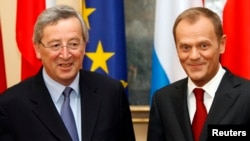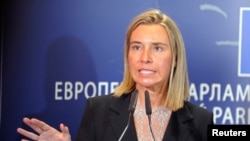At first sight, the European Union's new leadership team looks like a missed opportunity.
Jean-Claude Juncker, Donald Tusk and Federica Mogherini seem a less than ideal crew to tackle the EU's biggest challenges - dynamizing a stagnant economy, standing up to Russia over Ukraine and preventing Britain from drifting away from Europe.
Yet each may surprise their detractors on the upside.
The former Luxembourg prime minister, current Polish prime minister and Italian foreign minister bring a combination of wily west European compromise building, stolid central European determination and youthful Mediterranean exuberance to the task.
They tick the requisite boxes of political balance between left and right, north and south, east and west, men and women, and big and small states.
Whether they have the leadership and communication skills, and in Mogherini's case the diplomatic experience, to restore confidence in the EU and command respect abroad remains to be seen.
This was the year when the 28-nation bloc had an opportunity to choose a new set of top officials after many voters expressed their disenchantment with the EU through mass abstention and big protest votes in European Parliament elections in May.
But rather than reach for the most talented statesmen and women - EU luminaries like France's Pascal Lamy, Italy's Mario Monti or Sweden's Carl Bildt - national leaders preferred to play safe by picking a trio of relatively low-profile figures unlikely to threaten their own dominance of European policy.
None of the newcomers has the stature of a Jacques Delors, the greatest European Commission president, nor of European Central Bank President Mario Draghi.
Yet they have the potential to grow into their roles provided member states do not sap their authority or continue to blame “Brussels” for their own poor decision-making and in Juncker the EU has a consummate deal-maker who knows how to navigate the bloc's tortuous corridors of power.
German hand
The appointments reflect the ascendancy of Germany and its Chancellor Angela Merkel since the euro zone crisis began in 2010, making Berlin the indispensable power in Europe.
Juncker, 59, a veteran broker of Franco-German deals in economic and monetary affairs, was the leading candidate of Merkel's centre-right group in the European elections and long a protégé of her political mentor, former Chancellor Helmut Kohl.
He brings a quarter century of experience, mostly behind closed doors, to the European Commission presidency. He can be irritable with the media and secretive in dealings with his peers.
Tusk, 57, who speaks German but basic English and no French - the EU's main working languages - has presided over a historic rapprochement between Poland and Germany. He has long been Merkel's preferred candidate for a top European job.
Tusk has led his nation of 40 million through seven years of economic growth and rising political and diplomatic influence in central Europe and the EU.
Critics say he has shied away from bold economic reforms and slowed Warsaw's path towards joining the euro out of electoral timidity. His last year in office has been marred by political scandals.
Janis Emmanouilidis, chief political analyst at the European Policy Centre in Brussels, dismissed media criticism of Tusk's linguistic shortcomings.
“If Chancellor Merkel, who does not address the public in English, wanted to become president of the European Council, would we have doubted her ability?” he told Reuters. “President (Jose Manuel) Barroso speaks many languages. Did that make him the strongest of Commission presidents?”
The most controversial choice was Mogherini, 41, who has only six months' government experience and was criticized by several central European countries as being too soft on Russia over its destabilization of eastern Ukraine.
A veteran former EU official said he feared Russian Foreign Minister Sergei Lavrov would “eat her for breakfast”.
Some EU governments and many strategic analysts would have preferred Polish Foreign Minister Radislaw Sikorski, a strategic thinker and fine orator, to give EU foreign policy a stronger profile. But Berlin and Paris saw him as too provocative towards Russia - and in terms of the box-ticking, he suffered the dual handicap of being neither a socialist nor a woman.
Outspoken Lithuanian President Dalia Grybauskaite opposed Mogherini in July, saying she would not support a person who lacked experience and was “pro-Kremlin”. She made it known she had not voted for the Italian on Saturday.
“She is just too new in the business, being foreign minister for only a few months, not having a personal network of foreign policy contacts,” Emmanouilidis said. “Member states chose her and not others because they do not want someone who would create problems.”
Here too, Merkel's hand was visible. By backing the Italian novice for the foreign policy job, the chancellor was able to throw a bone to socialist Italian Prime Minister Matteo Renzi without yielding to his campaign to ease tight budget austerity.
The Socialists, runners-up in the pan-European elections, ended up with two lesser positions - foreign policy chief and European Parliament president - while conservatives took the two top posts, running the EU executive that proposes and enforces community laws, and chairing the bloc's policymaking summits.
No honeymoon
All three incoming officials have only limited scope to make EU policies more effective, partly because of the inherent difficulty of getting 28 sovereign states to agree, but also due to a widespread desire to avoid changing the bloc's governing treaty for fear of losing referendums.
The new EU leadership will have no honeymoon with the euro zone economy in the doldrums, unemployment high, the conflict in eastern Ukraine degenerating rapidly and rampant Euroscepticism gaining political ground in Britain.
The outgoing tandem of Barroso and European Council President Herman Van Rompuy battled hard to save the euro in the debt crisis. But they were seen as uninspiring leaders and made convenient scapegoats for Europe's unpopularity.
Outgoing foreign policy chief Catherine Ashton got the job almost by accident in 2009 with scant international experience. The media-shy Briton had some successes in the Balkans and in handling nuclear talks with Iran but she has not built a global role for European foreign policy, partly because the big member states don't want to hand that role to Brussels.
Mogherini gave a self-assured performance at the European Parliament's foreign affairs committee on Tuesday, supporting tougher EU sanctions against Russia over its military presence in Ukraine.
“We need to respond in the strongest possible way,” she said, adding that Moscow had wrecked its “strategic partnership” with Europe through its own actions.
Tusk made clear in his acceptance speech that he would work to keep Britain in the EU by negotiating reforms to meet some of London's concerns.
Juncker, who has also sounded conciliatory towards London despite British Prime Minister David Cameron's shrill campaign to block his appointment, has suggested he will shift the EU's economic policy mix somewhat from austerity towards investment.






